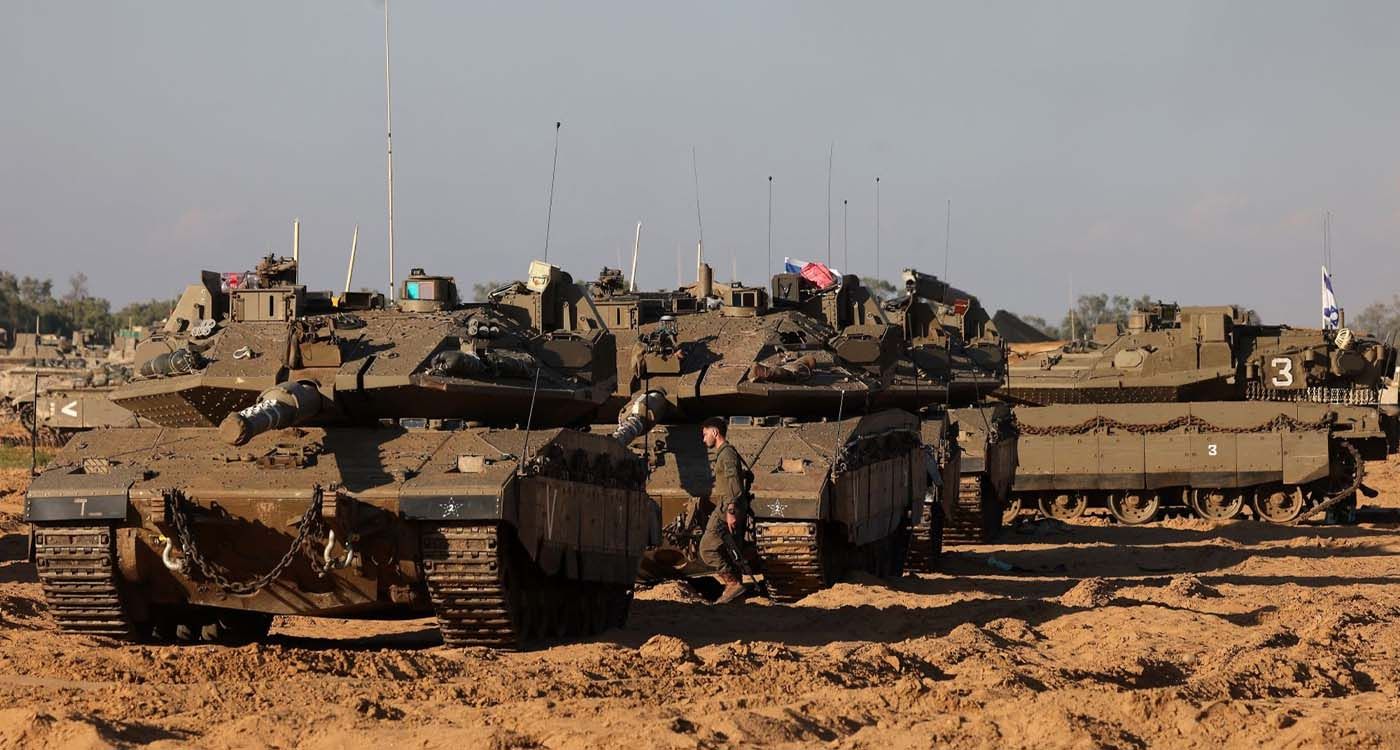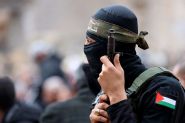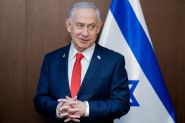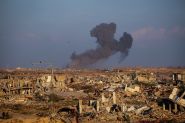- Home
- Middle East
- Total Offensive in Gaza: Israel Prepares Final Assault, Diplomacy at a Standstill

©(Menahem KAHANA/AFP)
As the war in Gaza enters what might be its final and most intense phase, Israel is ramping up its military operations while also confronting a new “aerial” threat from the Houthis in Yemen. Amid this military surge, the already catastrophic humanitarian crisis in Gaza continues to deepen, as diplomatic efforts stall under the weight of a relentless escalation.
The regional situation is also deteriorating rapidly. After the Houthis launched their first successful missile strike on Tel Aviv—followed by Israeli retaliatory attacks in Yemen—the conflict has entered a dangerously unstable phase, fueled by both military escalation and diplomatic paralysis.
Israeli airspace has once again become a zone of conflict. On May 4, a ballistic missile launched from Houthi-controlled territory in Yemen struck near Ben Gurion Airport in Tel Aviv, successfully bypassing Israel’s missile defense system. The incident caused a temporary suspension of air traffic and sparked widespread panic. Notably, this marks the first time the Houthis successfully hit a strategic target deep within Israeli territory.
In the aftermath, several international airlines suspended flights to Israel, amplifying the isolation of a nation already embroiled in one of the most intense conflicts in its modern history. Prime Minister Benjamin Netanyahu responded with a vow of large-scale retaliation against the Houthis and their regional backers. “It won’t be just one boom, but many booms,” he warned, underscoring Israel’s intention to wage a full-scale war to eliminate the threat.
Joint Military Response
On May 5, Israel, in coordination with the United States, followed through on its threats with a series of targeted airstrikes. According to Israeli sources, the strikes hit the port of Hodeidah — a key strategic hub on the Red Sea — along with weapons manufacturing facilities operated by the Iran-backed Houthi movement.
An Israeli official described the operation as a pivotal moment in the conflict, noting that nearly 50 munitions were deployed in an effort to dismantle the Houthis’ military infrastructure. “The games are over,” the official declared, highlighting a marked escalation in military intensity.
Avichay Adraee, the Israeli military’s Arabic-language spokesperson, stated on X that the targeted sites were “a central source of income for the terrorist Houthi regime.” He claimed the port of Hodeidah serves as a conduit for Iranian weaponry, military supplies, and other logistical support.
#عاجل 🔴 جيش الدفاع هاجم أهدافًا إرهابية لنظام الحوثي الإرهابي في #ميناء_الحديدة ومحيطه في #اليمن على بعد نحو 2000 كيلومتر عن اسرائيل
— افيخاي ادرعي (@AvichayAdraee) May 5, 2025
⭕️شنت طائرات حربية قبل قليل غارات استهدفت بنى تحتية إرهابية تابعة لنظام الحوثي الارهابي في منطقة الساحل اليمني.
⭕️جاءت الغارات ردًّا على… pic.twitter.com/7iX76VKpR5
Shortly after the attack on Hodeidah, the Houthi-aligned Saba News Agency reported that US airstrikes also hit the capital, Sanaa, and the road leading to the city's airport. Al-Masirah, another media outlet close to the group, reported seven additional strikes in the northern governorate of Al-Jawf.
“Gideon’s Chariots”
Simultaneously, Israel has unveiled a significant escalation of its ground campaign in Gaza. The Israeli Security Cabinet has greenlit a new military operation dubbed “Gideon’s Chariots”, which, according to Prime Minister Benjamin Netanyahu, aims to secure total control of the Gaza Strip and carry out the forced evacuation of its residents.
The ground operation is expected to begin imminently, with thousands of reservists being mobilized to support the Israeli forces. This marks a significant strategic shift, with Israel’s declared objective to permanently neutralize Hamas — a goal that appears to overlook the immense humanitarian fallout such an operation could unleash.
Humanitarian Blockade Under Military Control
On the ground, conditions have reached a breaking point. Israel maintains a near-total blockade on humanitarian aid, conditioning its entry on what it terms “security guarantees.” A proposed plan to funnel aid through a designated “sterile zone” in southern Gaza — under direct Israeli military control — has been strongly rejected by humanitarian groups and the United Nations.
“Humanitarian aid is being weaponized,” lamented Jan Egeland, Secretary General of the Norwegian Refugee Council. He noted that UN agencies have collectively refused to participate in the initiative, arguing that it “militarizes, manipulates, and politicizes aid,” while forcing civilians into displacement toward areas under direct military control.
The UN Office for the Coordination of Humanitarian Affairs (OCHA) has warned that “large areas of Gaza will remain completely cut off from supply,” and the World Food Programme (WFP) reported that its food stocks had been depleted as early as April 25.
Paralyzed Diplomacy
Amid growing military escalation, the diplomatic landscape — already fraught — appears increasingly stagnant. On Saturday evening, Israeli Prime Minister Benjamin Netanyahu dealt a significant blow to mediation efforts by sharply criticizing Qatar, a key player in ceasefire negotiations with Hamas and efforts to secure the release of hostages.
In his remarks, Netanyahu urged Qatar to "stop its double game," reaffirming Israel’s hardline stance: "Israel will win this legitimate war by legitimate means." These statements signaled a complete rejection of diplomatic avenues, suggesting that negotiations with Hamas are no longer under consideration.
This verbal assault on a major mediator in the Gaza conflict reflects the deepening diplomatic paralysis now defining the crisis. Qatar’s Foreign Ministry spokesperson, Majed al-Ansari, responded forcefully, calling Netanyahu’s comments “incendiary” and contrary to the principles of political and moral responsibility.
The exchange highlights the growing tensions in international relations surrounding the conflict, with global attention now turning to the stalled nuclear talks between Tehran and Washington. A failure in these negotiations could trigger an unprecedented escalation of regional tensions.
Read more




Comments